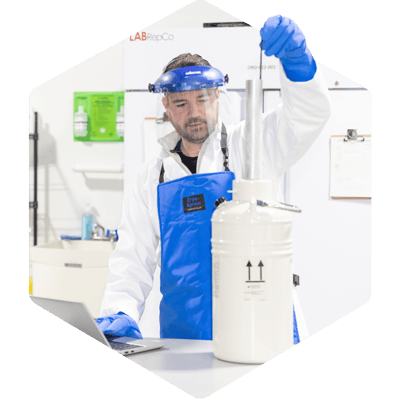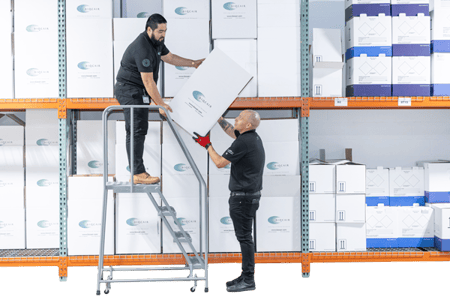Looking for more information?
Speak to one of our experts today and discuss your cold chain packaging requirements.
Thought Leadership

In the realm of life science logistics, the transportation of medical materials is not just about moving boxes from point A to point B. It is a complex blend of science, technology, and precision, where every degree in temperature and minute in transit can mean the difference between success and failure. As a specialist in life sciences logistics, we understand that the stakes could not be higher.
The life science sector faces unique challenges, particularly when looking at its packaging, primarily due to the sensitive nature of its cargo. Be it vaccines, personalised medicines, or biological samples, each requires meticulous handling, stable internal temperatures, and timely delivery. It's a task that demands more than just careful handling – it necessitates a blend of advanced technology, expert knowledge, and unwavering commitment.
Don Riach, UK Operations Director at Biocair, emphasizes this point:
"In life science logistics, every shipment carries with it the weight of human lives. Our approach to packaging combines cutting-edge technology with deep industry expertise to ensure these critical materials not only reach their destination safely but also contribute to advancing global healthcare."

The push towards making packaging circular, by opting for reusable and recyclable choices has been a trend across all industries. Growing pressure from our customers pushes us towards this trend even quicker. But, to simply opt for reusable options, in a sector whose cargo requires temperature-controlled solutions, presents its challenges.
Biocair offers temperature-controlled packaging solutions from -196ºC to +25ºC. Achieving specific temperatures requires advanced packaging technology, not just a traditional cardboard box. Identifying materials that offer the best thermal performance depends on several factors, including shipment method, route, seasonal and cross-hemisphere temperature variations, and duration of transit. 99.85% of all Biocair shipments arrive to its receiver within the temperature range specified for the load.
Although these materials cannot always be reusable, it is equally important to ensure they are right for the cargo. Considering the full journey of the package, and its unique requirements, will reduce errors in transit and negate the need for repeat deliveries, benefiting the environment.

Furthermore, smart choices can be made relating to other aspects of the packaging to ensure a better environmental choice. For example, Biocair utilizes large passive temperature control systems, which are more cost-effective and efficient than active systems, as they don't require compressors, fans, batteries, or electronics, and are lighter and less costly to ship.
Packaging can be perceived as wasteful, but an extended focus is also placed on this to ensure minimal packaging is used. We work with our partner, Peli Biothermal, to find non-wasteful solutions. These solutions consider the weight-to-space ratio to reduce carbon footprint, such as the Crēdo Go, a passive, reusable temperature-controlled shipper designed to fit the payload and performance requirements while reducing shipping costs and carbon footprint.
Riach adds:
“Biocair works hard to harness its global network to ensure its packaging is returned from its customers, and then ultimately put back into the supply chain and reused. The target is to ensure 50% of all shipments are packaged using 100% reusable materials by the end of 2024.”

A notable development in the industry is the use of advanced GPS tracking using 5G technology. We use track and trace technology so we can find any parcel, at any given time within 10 feet of its location. This capability has been enhanced through our partnership with Trakcel, showcasing a commitment to providing customers with unparalleled visibility and control over their shipments.
By providing real-time data and predictive insights, technology offers clarity and control in a process where there's no room for error.
Understanding local customs procedures is paramount in reducing risks during transit. Riach emphasises that Biocair's global network of offices and facilities plays a vital role in this.
"Our local expertise helps us navigate complex customs environments, ensuring shipments remain intact and on schedule," he states. “It’s not uncommon for life science packages to get extra checks at customs, sometimes due to fears that the extra insulation to control temperatures may contain illegal drugs or other substances. Working closely with authorities is key to ensure a quick transition out of customs.”
Furthermore, understanding the facilities available in each country is crucial. For instance, not all African countries have refrigeration facilities at customs, so it’s vital to ‘double-up’ on thermal insulation to ensure temperatures are held at the right level for longer, reducing the risk of the shipment becoming spoilt. Only by working with a specialist life-sciences logistics partner will you get the right personalized support for your shipments.
In life sciences, the stakes are high, and the margin for error is low. Riach states:
"Our packaging needs to be innovative as it needs to minimize the risk as far as possible to prevent temperature excursions. Many medicines are so unstable they simply cannot survive excursions during transit.”
To ensure risk is minimized, Biocair offers extended validation times through the use of advanced materials such as vacuum insulation panels, which offer superior insulation compared to traditional materials.
In 2024, Biocair is poised to continue our leadership in the industry, driven by its commitment to sustainability, technological innovation, local knowledge and industry-leading collaborations. We seek to stay ahead of new industry developments, like the introduction of pioneering dry ice solutions that last over 20 days, much longer than current systems which last around 4-5 days.
Article originally published on European Pharmaceutical Manufacturer.
Speak to one of our experts today and discuss your cold chain packaging requirements.